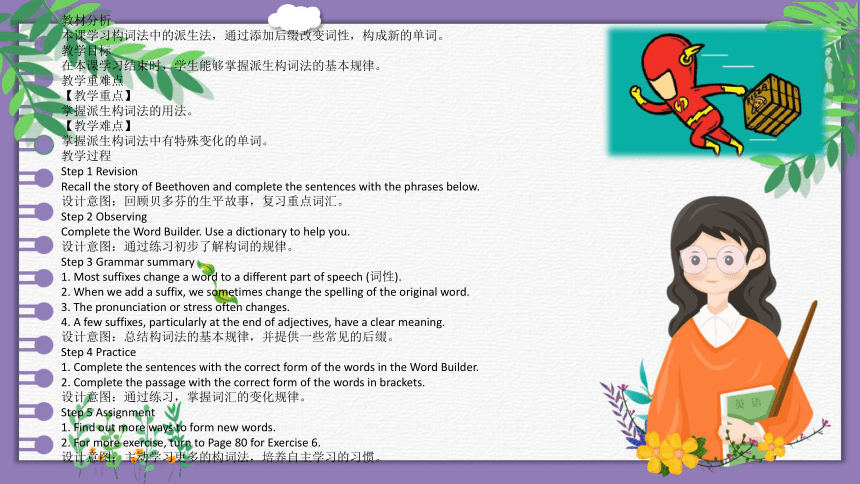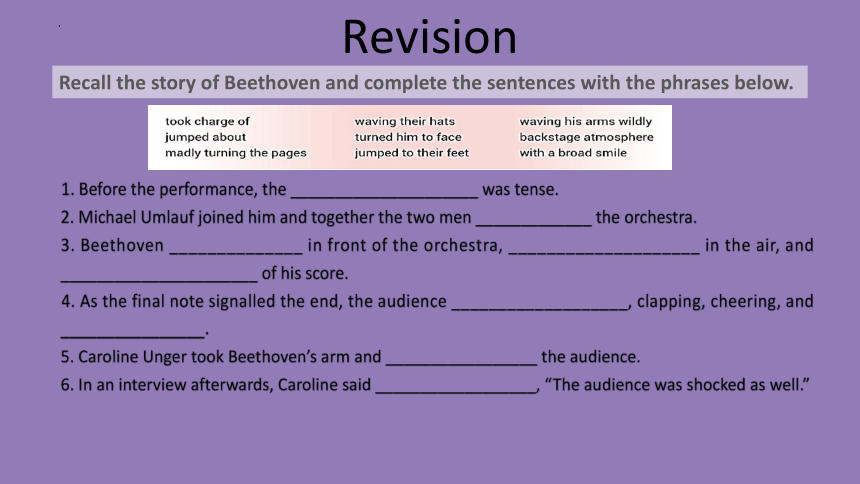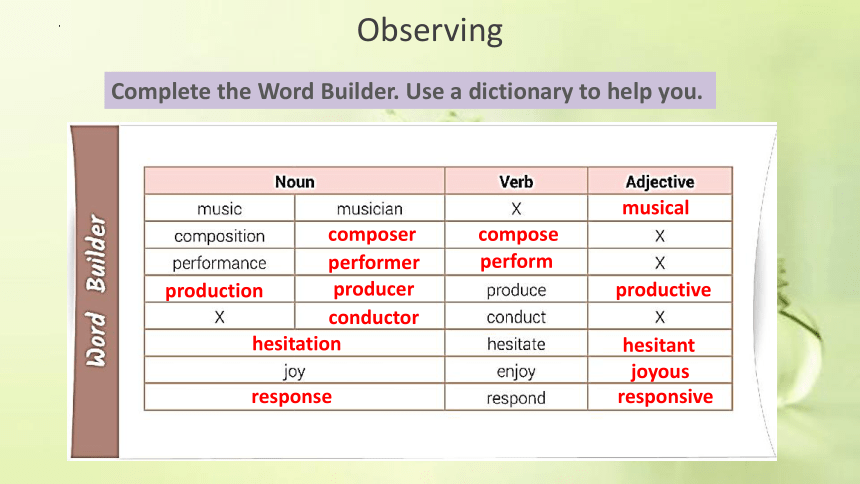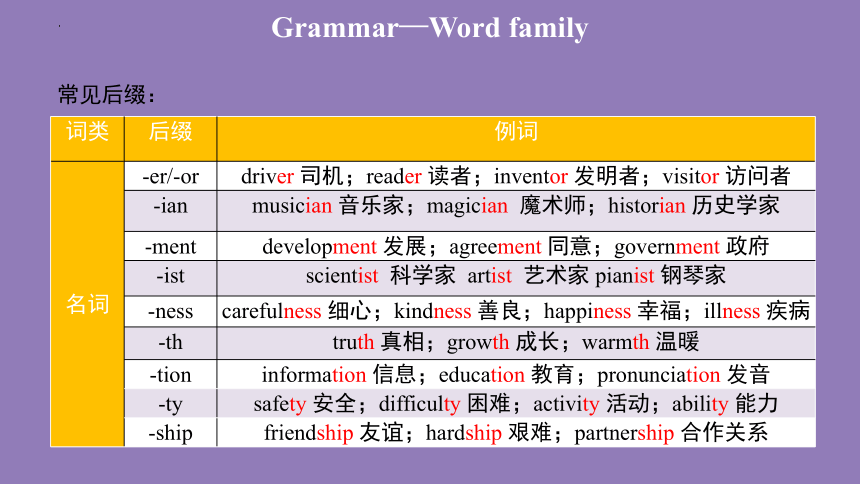北师大版(2019)必修第三册Unit 7 Art Lesson 3 A Musical Genius 语法精讲课件(共19张PPT)
文档属性
| 名称 | 北师大版(2019)必修第三册Unit 7 Art Lesson 3 A Musical Genius 语法精讲课件(共19张PPT) |

|
|
| 格式 | pptx | ||
| 文件大小 | 8.1MB | ||
| 资源类型 | 教案 | ||
| 版本资源 | 北师大版(2019) | ||
| 科目 | 英语 | ||
| 更新时间 | 2024-03-08 14:20:58 | ||
图片预览







文档简介
(共19张PPT)
Unit 7 Art
Lesson 3
Grammar Focus
教材分析
本课学习构词法中的派生法,通过添加后缀改变词性,构成新的单词。
教学目标
在本课学习结束时,学生能够掌握派生构词法的基本规律。
教学重难点
【教学重点】
掌握派生构词法的用法。
【教学难点】
掌握派生构词法中有特殊变化的单词。
教学过程
Step 1 Revision
Recall the story of Beethoven and complete the sentences with the phrases below.
设计意图:回顾贝多芬的生平故事,复习重点词汇。
Step 2 Observing
Complete the Word Builder. Use a dictionary to help you.
设计意图:通过练习初步了解构词的规律。
Step 3 Grammar summary
1. Most suffixes change a word to a different part of speech (词性).
2. When we add a suffix, we sometimes change the spelling of the original word.
3. The pronunciation or stress often changes.
4. A few suffixes, particularly at the end of adjectives, have a clear meaning.
设计意图:总结构词法的基本规律,并提供一些常见的后缀。
Step 4 Practice
1. Complete the sentences with the correct form of the words in the Word Builder.
2. Complete the passage with the correct form of the words in brackets.
设计意图:通过练习,掌握词汇的变化规律。
Step 5 Assignment
1. Find out more ways to form new words.
2. For more exercise, turn to Page 80 for Exercise 6.
设计意图:主动学习更多的构词法,培养自主学习的习惯。
Revision
Recall the story of Beethoven and complete the sentences with the phrases below.
1. Before the performance, the _____________________ was tense.
2. Michael Umlauf joined him and together the two men _____________ the orchestra.
3. Beethoven ______________ in front of the orchestra, ____________________ in the air, and ______________________ of his score.
4. As the final note signalled the end, the audience ___________________, clapping, cheering, and ________________.
5. Caroline Unger took Beethoven’s arm and _________________ the audience.
6. In an interview afterwards, Caroline said __________________, “The audience was shocked as well.”
Focusing on language:
Word building
musical
Observing
Complete the Word Builder. Use a dictionary to help you.
composer
compose
performer
perform
production
producer
productive
conductor
hesitation
hesitant
joyous
response
responsive
Grammar—Word family
常见前缀:
dis- 表示“不,无” im- 表示“不” in- 表示“不” ir-
表示“不,无”
dishonest 不诚实的 disagree 不同意 dislike 不喜欢 disadvantage 缺点 impossible 不可能的 impatient 不耐烦的 imbalance 不平衡的immoral 不道德的 inexpensive 不贵的 informal 非正式的 incapable 没有能力的 incorrect 不正确的 irregular 不规则的
irrelative 无关的
irresistible 不可抗拒的
irrational 不合理的
inter- 表示“相互” re- 表示“再;重复” mis- 表示“错误的” un-
表示“不”
Internet 互联网 international 国际的 interact 相互作用 interchange 交换 retell 重述 rewrite 重写 rebuild 重建 restart 重新开始 mistake 错误 misunderstand 误会 misuse 乱用 misfortune 不幸 unable 不能的
unhappy 不开心的
unexpected 出乎意料的
unpopular 不受欢迎的
常见后缀:
词类 后缀 例词
名词 -er/-or driver 司机;reader 读者;inventor 发明者;visitor 访问者
-ian musician 音乐家;magician 魔术师;historian 历史学家
-ment development 发展;agreement 同意;government 政府
-ist scientist 科学家 artist 艺术家 pianist 钢琴家
-ness carefulness 细心;kindness 善良;happiness 幸福;illness 疾病
-th truth 真相;growth 成长;warmth 温暖
-tion information 信息;education 教育;pronunciation 发音
-ty safety 安全;difficulty 困难;activity 活动;ability 能力
-ship friendship 友谊;hardship 艰难;partnership 合作关系
Grammar—Word family
词类 后缀 例词
形容词 -able, -ible comfortable 舒适的;useable 可用的;possible 可能的
-ful careful 小心的;helpful 有帮助的;useful 有用的
-ive active 积极的;attractive 有吸引力的;productive 生产的
-less useless 无用的;homeless 无家可归的;hopeless 没有希望的
-ly friendly 友好的;lovely 可爱的;lively 生动的
-ous dangerous 危险的;famous 著名的;serious 严肃的
-ese, -(ia)n Chinese 中国的;Australian 澳大利亚的;Canadian 加拿大的
-y healthy 健康的;cloudy 多云的;windy 有风的
-al natural 自然的;national 民族的;traditional 传统的
副词 -ly simply 简单地;quickly 迅速地;easily 容易地
Grammar—Word family
Build your words,
build your strength!
以一个单词为词根,加前缀或后缀构成一个新词的方法。
一般情况,加前缀不改变词性,只改变原词的词义;
在词根后加后缀,一般会改变词性。
Adding a
prefix or suffix
派生法
Grammar summary
Adding a
prefix or suffix
派生法
名词后缀:
-ment:
development,agreement,government
-er/-or表示人:
driver,reader,inventor,visitor
-ian表示人:
musician,magician,historian
-ist表示人:
scientist,artist,pianist
Grammar summary
Adding a
prefix or suffix
派生法
名词后缀:
-ness:
carefulness,kindness,happiness,illness
-th:
truth,growth,warmth
-tion:
information,education,pronunciation
-ty:
safety,difficulty,activity,ability
-ship:
hardship,partnership,friendship
Grammar summary
Adding a
prefix or suffix
派生法
形容词后缀:
-ful:
careful,helpful,useful
-less:
useless,homeless,hopeless
-ly:
friendly,lovely,lively
-ive:
active,attractive,productive
-able/-ible:
usable,possible,comfortable
Grammar summary
Adding a
prefix or suffix
派生法
形容词后缀:
-ous:
dangerous,famous,ambitious
-y:
healthy,cloudy,windy,snowy
-al:
natural,national,traditional
副词后缀:
-ly:
simply,happily,quickly
Grammar summary
Vocabulary Learning—hesitate
【释义】
vi. to be slow to speak or act because you feel uncertain or nervous; to be worried about doing something, especially because you are not sure that it is right or appropriate 犹豫;迟疑;顾虑
【例句】
I didn’t hesitate for a moment about taking the job.
我毫不犹豫地接受了那份工作。
Please do not hesitate to contact me if you have any queries.
如果有疑问就请尽管和我联系。
【同根词】
hesitation n. 犹豫;hesitant adj. 犹豫的
【常用搭配】
[not hesitate to do]
If this things happened to you, do not hesitate to report.
如果这种事情发生在你身上,就要毫不犹豫地报告。
hesitate
/ hez te t/
Vocabulary Learning—respond
【释义】
vt. to give a spoken or written answer to somebody or something 回答;回复
vi. to do something as a reaction to something that somebody has said or done 作出反应;回应
【例句】
I asked him his name, but he didn’t respond.
我问他叫什么名字,可他没回答。
How did they respond to the news
他们对这则消息有什么反应
【词语辨析】response n. 反应;回应
【词语辨析】respond, reply
respond 正式用词,指即刻的,以口头或行动对外来的号召、请求或刺激等作出回答或响应。
reply 较正式用词,侧重经过考虑的较正式答复。
respond
/r s p nd/
Vocabulary Learning—signal
【释义】
vt.& vi. to be a sign that something exists or is likely to happen标志着;to give information in writing 标明;to make a movement or sound to give somebody a message or an order 发信号
n. a movement or sound that you make to give somebody information, instructions or warnings 信号
【例句】
You must signal which way you are going to turn.
你要朝哪个方向转,必须发出信号。
Chest pains can be a warning signal of heart problems.
胸部疼痛可能是心脏病的报警信号。
【同根词】symbol, signal
symbol 指作象征或表达某种深邃意蕴的特殊事物;
signal 指为某一目的而有意发出的信号。
signal
/ s ɡn l/
Vocabulary Learning—struggle
【释义】
v. to try very hard to do sth. when it is difficult or when there are a lot of
problems; to fight against sb./sth. in order to prevent a bad situation or result 奋斗;努力;争取 ;抗争
【例句】
They struggled just to pay their bills. 他们辛苦所得仅敷日用。
Shona struggled for breath. 肖娜艰难地喘着气。
【常用搭配】
[+ for sth.]
We shall not have to struggle for our daily existence as we do now.
我们将不会有我们的日常斗争的存在,因为我们现在要做的。
[+ against/with sb./sth.]
My grandfather struggled against cancer for two years.
我的爷爷同癌症抗争了两年。
【单词变形】
adj. struggling 奋斗的;努力的 n. struggler 奋斗者;斗争者
v. struggling 努力;斗争;竞争
【同义词】effort
struggle
/'str g( )l/
THANK YOU
Unit 7 Art
Lesson 3
Grammar Focus
教材分析
本课学习构词法中的派生法,通过添加后缀改变词性,构成新的单词。
教学目标
在本课学习结束时,学生能够掌握派生构词法的基本规律。
教学重难点
【教学重点】
掌握派生构词法的用法。
【教学难点】
掌握派生构词法中有特殊变化的单词。
教学过程
Step 1 Revision
Recall the story of Beethoven and complete the sentences with the phrases below.
设计意图:回顾贝多芬的生平故事,复习重点词汇。
Step 2 Observing
Complete the Word Builder. Use a dictionary to help you.
设计意图:通过练习初步了解构词的规律。
Step 3 Grammar summary
1. Most suffixes change a word to a different part of speech (词性).
2. When we add a suffix, we sometimes change the spelling of the original word.
3. The pronunciation or stress often changes.
4. A few suffixes, particularly at the end of adjectives, have a clear meaning.
设计意图:总结构词法的基本规律,并提供一些常见的后缀。
Step 4 Practice
1. Complete the sentences with the correct form of the words in the Word Builder.
2. Complete the passage with the correct form of the words in brackets.
设计意图:通过练习,掌握词汇的变化规律。
Step 5 Assignment
1. Find out more ways to form new words.
2. For more exercise, turn to Page 80 for Exercise 6.
设计意图:主动学习更多的构词法,培养自主学习的习惯。
Revision
Recall the story of Beethoven and complete the sentences with the phrases below.
1. Before the performance, the _____________________ was tense.
2. Michael Umlauf joined him and together the two men _____________ the orchestra.
3. Beethoven ______________ in front of the orchestra, ____________________ in the air, and ______________________ of his score.
4. As the final note signalled the end, the audience ___________________, clapping, cheering, and ________________.
5. Caroline Unger took Beethoven’s arm and _________________ the audience.
6. In an interview afterwards, Caroline said __________________, “The audience was shocked as well.”
Focusing on language:
Word building
musical
Observing
Complete the Word Builder. Use a dictionary to help you.
composer
compose
performer
perform
production
producer
productive
conductor
hesitation
hesitant
joyous
response
responsive
Grammar—Word family
常见前缀:
dis- 表示“不,无” im- 表示“不” in- 表示“不” ir-
表示“不,无”
dishonest 不诚实的 disagree 不同意 dislike 不喜欢 disadvantage 缺点 impossible 不可能的 impatient 不耐烦的 imbalance 不平衡的immoral 不道德的 inexpensive 不贵的 informal 非正式的 incapable 没有能力的 incorrect 不正确的 irregular 不规则的
irrelative 无关的
irresistible 不可抗拒的
irrational 不合理的
inter- 表示“相互” re- 表示“再;重复” mis- 表示“错误的” un-
表示“不”
Internet 互联网 international 国际的 interact 相互作用 interchange 交换 retell 重述 rewrite 重写 rebuild 重建 restart 重新开始 mistake 错误 misunderstand 误会 misuse 乱用 misfortune 不幸 unable 不能的
unhappy 不开心的
unexpected 出乎意料的
unpopular 不受欢迎的
常见后缀:
词类 后缀 例词
名词 -er/-or driver 司机;reader 读者;inventor 发明者;visitor 访问者
-ian musician 音乐家;magician 魔术师;historian 历史学家
-ment development 发展;agreement 同意;government 政府
-ist scientist 科学家 artist 艺术家 pianist 钢琴家
-ness carefulness 细心;kindness 善良;happiness 幸福;illness 疾病
-th truth 真相;growth 成长;warmth 温暖
-tion information 信息;education 教育;pronunciation 发音
-ty safety 安全;difficulty 困难;activity 活动;ability 能力
-ship friendship 友谊;hardship 艰难;partnership 合作关系
Grammar—Word family
词类 后缀 例词
形容词 -able, -ible comfortable 舒适的;useable 可用的;possible 可能的
-ful careful 小心的;helpful 有帮助的;useful 有用的
-ive active 积极的;attractive 有吸引力的;productive 生产的
-less useless 无用的;homeless 无家可归的;hopeless 没有希望的
-ly friendly 友好的;lovely 可爱的;lively 生动的
-ous dangerous 危险的;famous 著名的;serious 严肃的
-ese, -(ia)n Chinese 中国的;Australian 澳大利亚的;Canadian 加拿大的
-y healthy 健康的;cloudy 多云的;windy 有风的
-al natural 自然的;national 民族的;traditional 传统的
副词 -ly simply 简单地;quickly 迅速地;easily 容易地
Grammar—Word family
Build your words,
build your strength!
以一个单词为词根,加前缀或后缀构成一个新词的方法。
一般情况,加前缀不改变词性,只改变原词的词义;
在词根后加后缀,一般会改变词性。
Adding a
prefix or suffix
派生法
Grammar summary
Adding a
prefix or suffix
派生法
名词后缀:
-ment:
development,agreement,government
-er/-or表示人:
driver,reader,inventor,visitor
-ian表示人:
musician,magician,historian
-ist表示人:
scientist,artist,pianist
Grammar summary
Adding a
prefix or suffix
派生法
名词后缀:
-ness:
carefulness,kindness,happiness,illness
-th:
truth,growth,warmth
-tion:
information,education,pronunciation
-ty:
safety,difficulty,activity,ability
-ship:
hardship,partnership,friendship
Grammar summary
Adding a
prefix or suffix
派生法
形容词后缀:
-ful:
careful,helpful,useful
-less:
useless,homeless,hopeless
-ly:
friendly,lovely,lively
-ive:
active,attractive,productive
-able/-ible:
usable,possible,comfortable
Grammar summary
Adding a
prefix or suffix
派生法
形容词后缀:
-ous:
dangerous,famous,ambitious
-y:
healthy,cloudy,windy,snowy
-al:
natural,national,traditional
副词后缀:
-ly:
simply,happily,quickly
Grammar summary
Vocabulary Learning—hesitate
【释义】
vi. to be slow to speak or act because you feel uncertain or nervous; to be worried about doing something, especially because you are not sure that it is right or appropriate 犹豫;迟疑;顾虑
【例句】
I didn’t hesitate for a moment about taking the job.
我毫不犹豫地接受了那份工作。
Please do not hesitate to contact me if you have any queries.
如果有疑问就请尽管和我联系。
【同根词】
hesitation n. 犹豫;hesitant adj. 犹豫的
【常用搭配】
[not hesitate to do]
If this things happened to you, do not hesitate to report.
如果这种事情发生在你身上,就要毫不犹豫地报告。
hesitate
/ hez te t/
Vocabulary Learning—respond
【释义】
vt. to give a spoken or written answer to somebody or something 回答;回复
vi. to do something as a reaction to something that somebody has said or done 作出反应;回应
【例句】
I asked him his name, but he didn’t respond.
我问他叫什么名字,可他没回答。
How did they respond to the news
他们对这则消息有什么反应
【词语辨析】response n. 反应;回应
【词语辨析】respond, reply
respond 正式用词,指即刻的,以口头或行动对外来的号召、请求或刺激等作出回答或响应。
reply 较正式用词,侧重经过考虑的较正式答复。
respond
/r s p nd/
Vocabulary Learning—signal
【释义】
vt.& vi. to be a sign that something exists or is likely to happen标志着;to give information in writing 标明;to make a movement or sound to give somebody a message or an order 发信号
n. a movement or sound that you make to give somebody information, instructions or warnings 信号
【例句】
You must signal which way you are going to turn.
你要朝哪个方向转,必须发出信号。
Chest pains can be a warning signal of heart problems.
胸部疼痛可能是心脏病的报警信号。
【同根词】symbol, signal
symbol 指作象征或表达某种深邃意蕴的特殊事物;
signal 指为某一目的而有意发出的信号。
signal
/ s ɡn l/
Vocabulary Learning—struggle
【释义】
v. to try very hard to do sth. when it is difficult or when there are a lot of
problems; to fight against sb./sth. in order to prevent a bad situation or result 奋斗;努力;争取 ;抗争
【例句】
They struggled just to pay their bills. 他们辛苦所得仅敷日用。
Shona struggled for breath. 肖娜艰难地喘着气。
【常用搭配】
[+ for sth.]
We shall not have to struggle for our daily existence as we do now.
我们将不会有我们的日常斗争的存在,因为我们现在要做的。
[+ against/with sb./sth.]
My grandfather struggled against cancer for two years.
我的爷爷同癌症抗争了两年。
【单词变形】
adj. struggling 奋斗的;努力的 n. struggler 奋斗者;斗争者
v. struggling 努力;斗争;竞争
【同义词】effort
struggle
/'str g( )l/
THANK YOU
同课章节目录
- Unit 7 Art
- Lesson 1 Masterpieces
- Lesson 2 Beijing Opera
- Lesson 3 A Musical Genius
- Unit 8 Green living
- Lesson 1 Roots and Shoots
- Lesson 2 Greening the Desert
- Lesson 3 "White Bikes" on the Road
- Unit 9 Learning
- Lesson 1 Active Learning
- Lesson 2 Language Learning Tips
- Lesson 3 The Secrets of Your Memory
